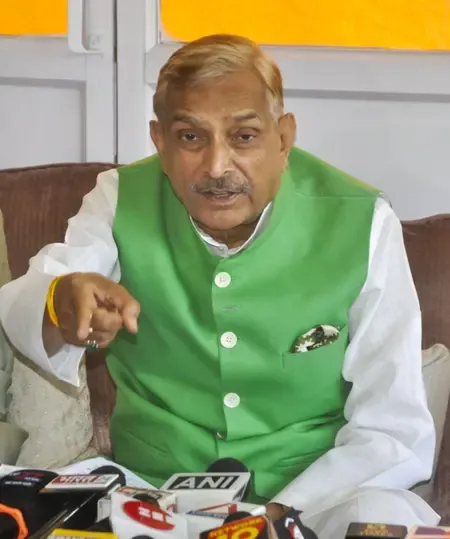What Agenda Did the INDIA Bloc Finalize to Challenge the Centre in Parliament?

Synopsis
Key Takeaways
- Critical issues discussed include the Pahalgam terror attack and Operation Sindoor.
- The opposition is uniting around a clear agenda to challenge the government's actions.
- Concerns over electoral roll manipulations have been raised, indicating a potential threat to democracy.
- Foreign policy issues regarding Pakistan, China, and Gaza are also on the agenda.
- 24 parties are collaborating, showcasing a strong political alliance against the ruling government.
New Delhi, July 19 (NationPress) In a show of solidarity, leading figures from the INDIA bloc convened virtually on Saturday to reach an agreement on pivotal concerns ahead of the forthcoming Monsoon session of Parliament, which is set to commence on Monday.
With representatives from 24 parties—including Congress President Mallikarjun Kharge, Sonia Gandhi, Rahul Gandhi, Sharad Pawar of NCP (SP), and Dipankar Bhattacharya of CPI(ML)—the opposition demonstrated a robust challenge to the government by uniting around a more focused agenda.
Central to their dialogue were eight urgent issues the bloc aims to highlight in Parliament. These encompass the terror incident in Pahalgam, the Operation Sindoor, and Donald Trump's assertions regarding trade incentives that allegedly hindered the India-Pakistan conflict. A new front has also emerged regarding the Election Commission’s Special Intensive Revision (SIR) of electoral rolls in Bihar, which the opposition claims is a guise for “vote suppression” masquerading as administrative reform.
Foreign policy topics also received attention, with the opposition bloc preparing to scrutinize the government’s positions on Pakistan, China, and the Gaza crisis. Additionally, significant concerns were raised about delimitation orders and what the opposition describes as an increase in atrocities against Dalits, backward classes, tribals, women, and minorities. Furthermore, parliamentarians are set to demand clarifications on various issues, including the Ahmedabad plane crash.
“All 24 INDIA alliance parties, whether party leaders or senior representatives, actively participated in this crucial virtual meeting,” stated Congress MP and Deputy Leader of the Opposition in Rajya Sabha, Pramod Tiwari. “We have identified eight key matters to confront the government, firmly believing in democratic dialogue and accountability.”
Tiwari underscored the importance of specific issues: “The Pahalgam attack and Operation Sindoor touch the pride and dignity of our 144 crore citizens. Terrorists are still at large, and we need to address intelligence failures.” On foreign policy, he asserted, “Where is the Prime Minister’s leadership on Pakistan, China, and Gaza? If we consider these as vital national concerns, the PM must respond in Parliament.”
The opposition has also criticized the SIR-driven voter roll changes in Bihar. Tiwari claimed this amounts to an “undeclared emergency,” arguing that the removal of “non-BJP-aligned” voters and the addition of favorable ones constitutes deliberate manipulation. He vowed to treat this as “a threat to democracy.” Regarding delimitation reform, “Some alliance members have proposed ideas; we will discuss that as well,” he observed.
In response to inquiries about the absence of senior leaders like Akhilesh Yadav (SP), Mamata Banerjee (TMC), and MK Stalin (DMK), Tiwari clarified that Abhishek Banerjee represented the TMC, Ramgopal Yadav attended for the SP, and a senior leader participated from the DMK. “They are all responsible leaders of their parties, and their presence indicates complete commitment. It should not be interpreted as a lack of seriousness,” he explained. He also confirmed that Sharad Pawar represented the NCP (SP) at the meeting. “Such high-level virtual participation is uncommon and cannot be viewed as a lack of unity within the bloc,” he emphasized.
Regarding the ED’s chargesheet against Robert Vadra and the BJP’s intent to raise it, Tiwari insisted: “We are not swayed by their rhetoric. Where corruption is involved in any of our matters, we will speak out, including against voter roll manipulation.” When asked if the Aam Aadmi Party (AAP) remains part of the coalition, he reaffirmed, “All 24 alliance members were present in today’s meeting.”
As the Monsoon Session approaches, the INDIA bloc seems resolute in challenging the government across a broad spectrum—National security, electoral integrity, foreign affairs, and social justice.










